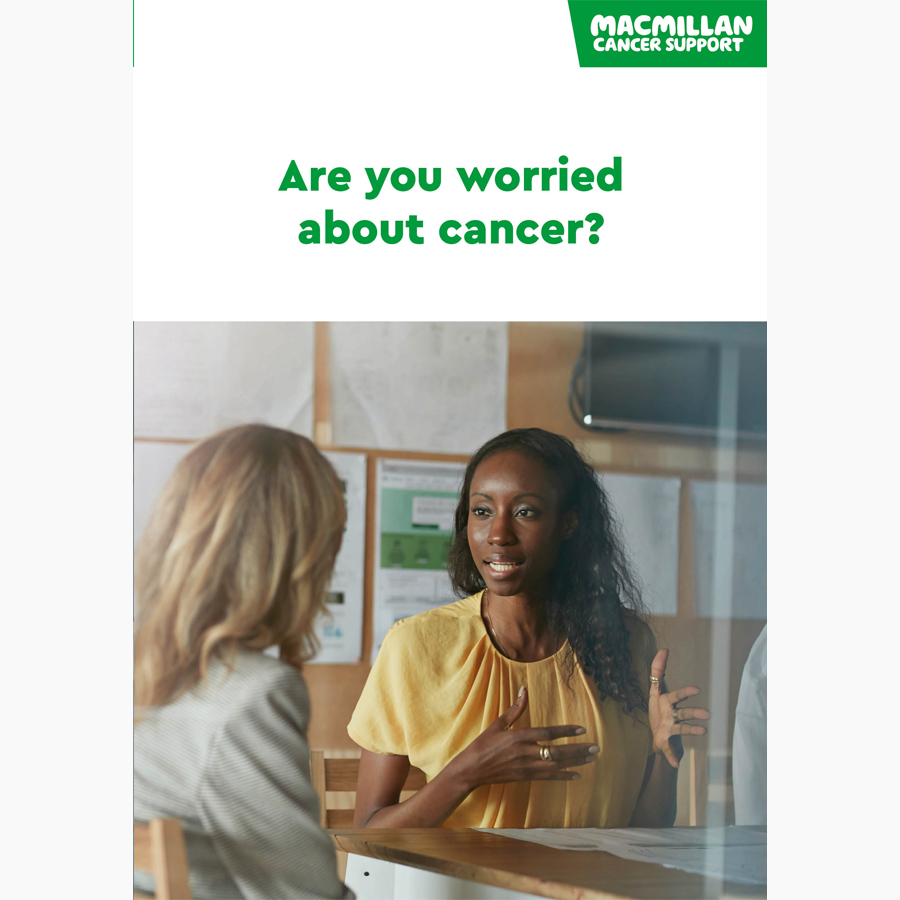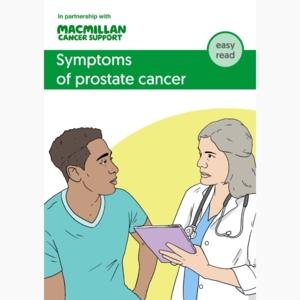Causes and risk factors of prostate cancer
What are prostate cancer risk factors?
Doctors do not know the exact causes of prostate cancer. But there are risk factors that can increase the chance of getting it. Having one or more risk factors does not mean you will get prostate cancer. There are different risk factors that may affect the risk of getting prostate cancer.
If you are worried about prostate cancer and would like to talk to someone, we're here. You can:
- Call the Macmillan Support Line on 0808 808 00 00.
- Chat to our specialists online.
Related pages
Age
This is the strongest risk factor for prostate cancer and your risk increases from the age of 50. It is uncommon under the age of 50 and more common over the age of 65. Risk factors like ethnicity and family history are linked with getting prostate cancer at a younger age.
Ethnicity
If you are Black, you have a much higher risk of developing prostate cancer. The reason for this is not clear, but it may be because of genetic factors. You are also more likely to develop prostate cancer at a younger age.
If you are Black and aged 45 or over, Prostate Cancer UK has more information about your risk. It gives advice on talking to your GP about your risk of getting prostate cancer and helps you to make decisions about having a PSA test.
If you are Asian, your risk of prostate cancer is much lower. We do not know why this is.
Family history
Sometimes there may be a possible family link (inherited). The risk of prostate cancer is higher if you have:
- either a father or brother who had prostate cancer – the risk is greater if they were diagnosed under the age of 60
- 2 or more close relatives (father, brother, grandfather, half-brother, uncle) on the same side of the family who had prostate cancer
- a mother who had breast cancer
- inherited certain cancer gene changes (mutations).
We get a copy of each of our genes from both parents. Genes are the instructions that tell our cells what to do. Doctors think 5 to 10 out of 100 prostate cancers (5% to 10%) are linked to inherited gene changes.
Rarely, prostate cancer may be linked to changes in certain genes. They are called BRCA1 and BRCA2. These altered genes increase the risk of breast and ovarian cancer in some families. If you have inherited the BRCA2 gene change, your risk of prostate cancer is 5 times higher. The BRCA1 gene may also increase your risk, but this is not as clear.
Prostate cancer risk is also higher if you have Lynch syndrome. Lynch syndrome is also called hereditary non-polyposis colorectal cancer (HNPCC). Lynch syndrome is rare but can increase the risk of a number of cancers.
Talk to your GP if you have a family history of cancer and are worried about your risk of prostate cancer.
We have more information about family history and cancer.
Body weight and diet
Being very overweight (obese) may increase the risk of having a more advanced prostate cancer. It may also increase the risk of having a faster-growing type of prostate cancer.
Eating a balanced diet and doing regular physical activity will keep you at a healthy weight.
Booklets and resources
Further resources
Prostate Cancer UK has developed an online tool to help you check your potential risk of prostate cancer.
About our information
-
References
Below is a sample of the sources used in our prostate cancer information. If you would like more information about the sources we use, please contact us at cancerinformationteam@macmillan.org.uk
C. Parker, E. Castro, K. Fizazi, et al. Prostate cancer: ESMO Clinical Practice Guidelines for diagnosis, treatment and follow-up. Annals of Oncology, 2020, Volume 31, Issue 9, p1119-1134. Available from www.esmo.org/guidelines/genitourinary-cancers/prostate-cancer
National Institute for Health and Care Excellence (2019) Prostate cancer: diagnosis and management (NICE guideline NG131). Last updated December 2021 to include Risk stratification for localised or locally advanced prostate cancer. Available at www.nice.org.uk/guidance/ng131
-
Reviewers
This information has been written, revised and edited by Macmillan Cancer Support’s Cancer Information Development team. It has been reviewed by expert medical and health professionals and people living with cancer. It has been approved by Senior Medical Editors, Dr Jim Barber, Consultant Clinical Oncologist and Dr Ursula McGovern, Consultant Medical Oncologist.
Our cancer information has been awarded the PIF TICK. Created by the Patient Information Forum, this quality mark shows we meet PIF’s 10 criteria for trustworthy health information.
The language we use
We want everyone affected by cancer to feel our information is written for them.
We want our information to be as clear as possible. To do this, we try to:
- use plain English
- explain medical words
- use short sentences
- use illustrations to explain text
- structure the information clearly
- make sure important points are clear.
We use gender-inclusive language and talk to our readers as ‘you’ so that everyone feels included. Where clinically necessary we use the terms ‘men’ and ‘women’ or ‘male’ and ‘female’. For example, we do so when talking about parts of the body or mentioning statistics or research about who is affected.
You can read more about how we produce our information here.
Date reviewed
This content is currently being reviewed. New information will be coming soon.

Our cancer information meets the PIF TICK quality mark.
This means it is easy to use, up-to-date and based on the latest evidence. Learn more about how we produce our information.
How we can help





